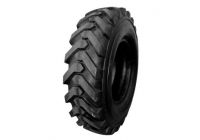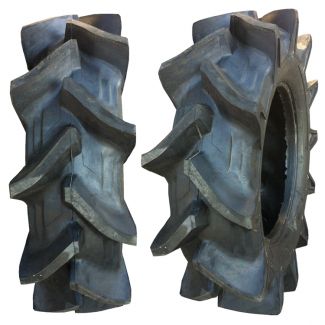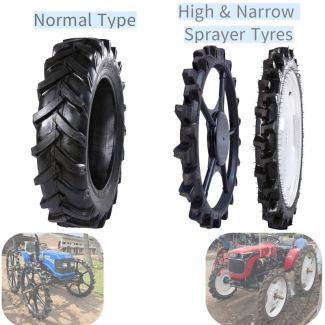Sprayer tyres, Rice transplanter tires and wheels, Agricultural tyres, tractor tires, Industrial Tyres, OTR Tires, skid tires, truck tires

Agricultural tyres play a crucial role in the overall productivity and efficiency of farming operations. These specialized tyres are designed to withstand the tough and varied conditions of farm work, such as heavy loads, rough terrain, and constant use. The production of agricultural tyres involves a complex process that combines advanced technology, engineering, and industry expertise.
1. Selection of raw materials: The first step in the production of agricultural tyres is the selection of raw materials. The quality of the raw materials used directly impacts the durability and performance of the final product. Most agricultural tyres are made from natural rubber, synthetic rubber, carbon black, and various chemical compounds.
2. Mixing and compounding: Once the raw materials have been selected, the next step is to prepare the rubber compound. This involves mixing the raw materials together in precise proportions to create a homogenous mixture. The mixing process is crucial as it determines the physical properties of the rubber, such as elasticity, durability, and resistance to wear and tear.
3. Fabrication: After the rubber compound has been mixed, it is sent to a machine called a fabric calendar. This machine applies heat and pressure to the rubber compound, transforming it into flat sheets of rubber, called plies. These plies will act as the base for the tyre's structure and provide strength and stability.
4. Forming the tyre: The flat sheets of rubber plies are then cut and stacked to form the basic shape of the tyre. This is done by a process called building. The number of plies used, their angles, and the order in which they are placed depend on the type of tyre being produced. A high-strength steel belt is also added at this stage to provide additional support and puncture resistance.
5. Vulkazaition: Once the tyre has been formed, it is moved to a vulcanization chamber. Here, the tyre is cured at high heat and pressure, which causes the rubber to bond together and form a solid structure. This process also gives the tyre its final shape and imparts strength and durability.
6. Finishing touches: After vulcanization, the tyre goes through a series of additional processes to give it the final finishing touches. These include trimming excess rubber, adding treads, and curing the rubber treads onto the tyre. The treads give the tyre its grip and control on various terrains and often involve complex design and engineering.
7. Quality control: Throughout the production process, quality control is a key factor. Each tyre undergoes rigorous inspection to ensure it meets industry standards for dimensions, strength, and durability. Any defects or imperfections are addressed at this stage, and only the tyres that pass the quality control are approved for distribution.
8. Final packaging and distribution: Once the tyres have been successfully produced and approved, they are ready for packaging and distribution. They are wrapped in protective rubber or cardboard wrapping to prevent any damage during transportation. From there, they are distributed to dealers, who sell them to farmers and other agricultural workers.

In addition to the production process, several factors contribute to the quality and performance of agricultural tyres. These include:
QINGDAO BOSTONE TYRE research and development, production, and sales of Agricultural tyres,Solid rice transplanter tyres,OTR tyres,High flotation tyres,Forklift tyres,Car tyres,Skid steer tyres,Implement tyres,Industrial tyres,Sprayer wheels and other products enjoy a high position among consumers. The company has established long-term and stable cooperative relationships with numerous enterprises. The company has passed certifications such as PAHS,REACH,DOT,CE. Our main export markets are Asia,Oceania,Europe, Australia, and other regions.
Bostone brand solid tire is suitable for trailers,lifting platform,forklifts, and various industrial vehicles for clean factory,airport,mining,construction,seaport,etc.With 17 years experiences that we can supplying the good quality and cheap prices tires!
Historically, agricultural tires were made of solid rubber and lacked the technology and versatility of modern-day tires. However, with the development of new materials and manufacturing techniques, agricultural tires have become more durable, resilient, and efficient.
One of the key technological advancements in agricultural tires is the use of radial tires. Unlike the traditional bias ply tires, radial tires have a more flexible sidewall and a larger footprint, providing better traction and reducing soil compaction. This results in improved yields and decreased fuel consumption for farmers.

Moreover, with the growth in precision farming practices, agricultural tires have also evolved to meet the specific requirements of different types of soil and crops. Specialized tread patterns and enhanced rubber compounds improve traction, minimize slippage, and reduce soil disturbance, making them ideal for use in precision farming.
In addition to technological developments, the international trade market has also played a significant role in the evolution of agricultural tires. As agricultural practices have become more globalized, the need for high-quality and efficient tires has increased. This has led to the expansion of the agricultural tire market, with major players such as Michelin, Bridgestone, and Goodyear dominating the industry.
With the growing demand for sustainable and environmentally friendly farming practices, there has also been a rise in the production of eco-friendly agricultural tires. These tires are made from renewable materials and have low rolling resistance, reducing fuel consumption and carbon emissions.
The development of new technologies and international trade in agricultural tires have also led to increased competition and improved pricing for farmers. The competition between manufacturers has resulted in the constant development of new and innovative tire designs, offering farmers a wide range of options to choose from based on their specific needs and budget.
However, with the rise of international trade, there has also been an influx of inferior quality and counterfeit tires in the market. These tires may be cheaper, but they have a shorter lifespan and can potentially harm the equipment and the environment. It is crucial for farmers to purchase agricultural tires from reputable manufacturers and suppliers to ensure the safety and efficiency of their farming operations.